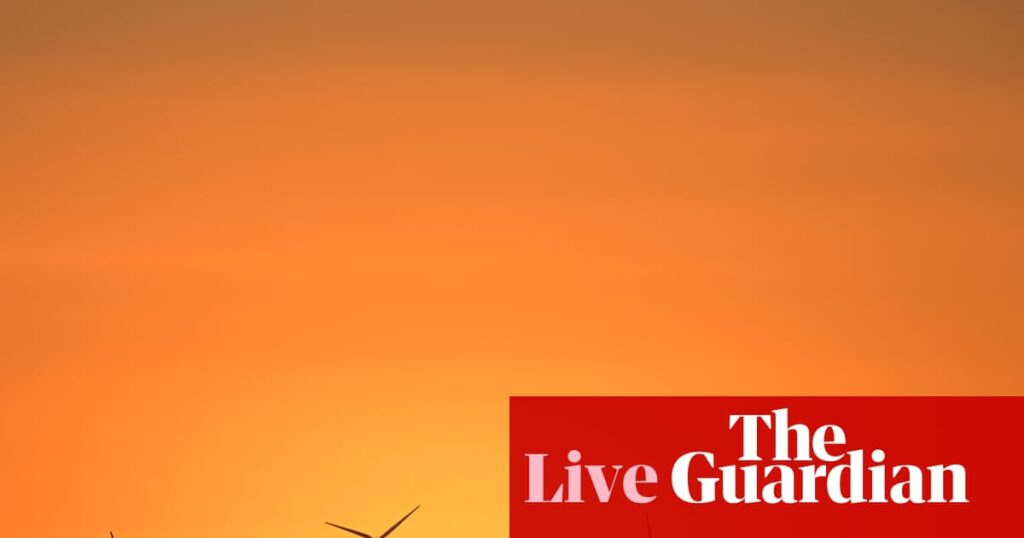Power prices could become more volatile, draft energy review says

Josh Butler
Australian power prices are likely to become more variable and more volatile due to the unpredictability of some renewable energy sources, a draft review of the nation’s electricity market (NEM) has warned.
The draft national electricity market review, released on Wednesday by the energy minister, Chris Bowen, says renewable energy – particularly consumer changes like rooftop solar and battery systems – can improve efficiency, reduce costs and improve outcomes for ordinary Australians.
But even Bowen admits the report finds that the energy transition away from fossil fuel means “reform is needed to ensure our modern grid is affordable and reliable”.
The report warns the NEM is facing “real” challenges and “mounting pressures”, but that they are not insurmountable. It says:
Due to changes to the way we generate and consume electricity, the NEM is becoming a system that is more weather dependent, more energy constrained, less scheduled and less dispatchable.
Key events
Jim Chalmers ‘optimistic’ AI can be force for good, but realises ‘risks’
The treasurer, Jim Chalmers, is talking about the priorities of his upcoming productivity roundtable at a press conference. He had this to say on artificial intelligence:
I’m optimistic that AI can be a force for good, but I’m also realistic about the risks. It is not beyond us, in my view, to maximise the opportunities of AI while we manage the risks the best that we can.
We can chart a middle course that makes our workers and our people and our industries beneficiaries, not victims, of technological change … The only way to make our people and workers and industries beneficiaries is if we treat AI as an enabler, not an enemy, of what we want to see in our economy. That means listening to people. It means empowering workers with the right skills as well.

Jonathan Barrett
Advertising revenue falls at News Corp’s Australian mastheads
News Corp’s Australian mastheads have endured another tough year, with revenue from advertising, circulation and subscription all down.
The company’s Australian division, which includes The Australian, Daily Telegraph and Herald Sun, saw advertising revenue fall by 5% to $US343m ($530m), while circulation and subscription income was down by 2%.
Weak advertising conditions have hit media companies around the world during a period marked by high inflation and elevated business costs.
News Corp’s Australian digital subscriber numbers did increase over the financial year, from 1.12m to 1.17m, according to financial results released early this morning.
The Australian division was still stronger than News Corp’s UK operations, where advertising revenue was down 11%.
While News Corp is best known for its traditional media assets, its book publishing, real estate portal and Dow Jones information businesses are the profit drivers.
Those businesses helped the Rupert Murdoch-controlled conglomerate post an overall increase in revenue during the past 12 months.

Tom McIlroy
Albanese increasing diplomatic moves on recognising Palestinian statehood
As he prepares to head to the UN general assembly in New York next month, Anthony Albanese has discussed plans to recognise Palestinian statehood with the organisation’s chief diplomat.
On Friday last week, the prime minister spoke with the UN secretary-general, António Guterres, about the ongoing war between Israel and terror group Hamas, and the growing coalition of countries preparing to recognise Palestine.
The Sydney Morning Herald and The Age first reported the contents of the conversation on Wednesday.
Albanese is intensifying diplomatic moves around recognition of Palestinian statehood, and has discussed the matter with world leaders including Emmanuel Macron of France overnight.
He had a call with the Palestinian Authority president, Mahmoud Abbas, on Tuesday and is publicly seeking a conversation with the Israeli prime minister, Benjamin Netanyahu, this week.
It’s possible Albanese will head to London after the UN trip in early September. The British prime minister, Keir Starmer, is one of the world leaders Albanese is coordinating with on recognition of statehood and the pair spoke about a possible bilateral visit at the G7 summit in Canada in June. A meeting with Donald Trump is also expected sometime in coming months.
Overnight, an Israeli security cabinet meeting, which had been expected to discuss Netanyahu’s call for the “full occupation” of Gaza, was postponed amid mounting tensions over whether the plan is feasible.
eSafety commissioner says latest report on YouTube, Apple’s treatment of abuse material ‘deeply concerning’
The eSafety commissioner, Julie Inman Grant, sharply criticised major tech companies following a report that Apple and YouTube were not tracking the number of child sexual abuse reports they received, saying the tech giants certainly had the ability to do so. She told RN Breakfast this morning:
I think this is hugely concerning. This is illegal content … and they’re enabling it and turning a blind eye.
Some of the companies, Apple and Google’s YouTube, would not even give us the number of trust and safety personnel they have, would not tell us how many child sexual abuse material reports they got or how quickly they responded to them. And some of the other platforms don’t even have public reporting functionality. So this is really problematic.
Inman Grant said companies had told her they couldn’t say how many employees were working on trust and safety, or how many reports of abuse they’d received. She called those claims “bollocks”.
They’ve got the technology, they’ve got the systems in place. What’s happening is we’re seeing a winding back of content moderation and trust and safety policies and an evisceration of trust and safety teams.

Josh Butler
Renewables can lead to long periods of low prices, but also sharp price spikes, report says
The report warns that the main driver of power prices is shifting – from being dependent on demand and supply-side fuel costs, to being increasingly influenced by “supply-side variability, driven by the weather-dependent nature” of renewable energy. It says:
Prices are increasingly characterised by longer periods of very low prices when solar and wind output is strong, punctuated by sharp, often very high, price spikes during periods of low renewable generation or unexpected outages.
Prices are likely to become predictably more variable and unpredictably more volatile.
The report says variability, like the daily changes in solar or wind output, can be forecast and managed – but volatility, like unexpected network outages or long-term changes in wind and solar output, “poses more significant challenges”.
The report is now out for consultation, with responses requested by 17 September. Chris Bowen said the final recommendations, to be delivered by the end of 2025, will be considered carefully. The minister said:
Australia has the world’s best sun and wind to power our future.
We’ve provided the certainty to get investment flowing, to secure the jobs we need now and into the future. We are working with the states and territories to deliver a better, fairer energy system that Australians deserve.
Power prices could become more volatile, draft energy review says

Josh Butler
Australian power prices are likely to become more variable and more volatile due to the unpredictability of some renewable energy sources, a draft review of the nation’s electricity market (NEM) has warned.
The draft national electricity market review, released on Wednesday by the energy minister, Chris Bowen, says renewable energy – particularly consumer changes like rooftop solar and battery systems – can improve efficiency, reduce costs and improve outcomes for ordinary Australians.
But even Bowen admits the report finds that the energy transition away from fossil fuel means “reform is needed to ensure our modern grid is affordable and reliable”.
The report warns the NEM is facing “real” challenges and “mounting pressures”, but that they are not insurmountable. It says:
Due to changes to the way we generate and consume electricity, the NEM is becoming a system that is more weather dependent, more energy constrained, less scheduled and less dispatchable.

Eelemarni Close-Brown
Skinks’ resistance to snake venom could streamline design of antivenoms, research suggests
Australian skinks have evolved the means to resist snake venom by shutting down their muscles, suggests new research, which could help to inform future treatments for snakebites.
Research led by the University of Queensland has found that multiple species of Australian skink have evolved venom resistance through changes to a critical muscle receptor.
In other animals, the receptor is the target of venom neurotoxins, which cause rapid paralysis and death.
Read more here:
Marles says government listening to Australians on Gaza, recognition of Palestinian state
Richard Marles was asked about growing calls for Australia to recognise a Palestinian state. He told RN Breakfast:
We listen to the Australian community, and that’s our job as a government … I think the protests that we saw over the weekend were a very powerful statement. Fundamentally, this government is thinking this through and based on what is the right thing to do here, what’s the right principle … thinking about this in terms of how any decision that we make will actually contribute to making a difference on the ground.
Because what we fundamentally want to see is an end to the tragedy that’s unfolding in the Middle East. The humanitarian disaster which has being played out in Gaza is an utter tragedy and the hostages that are held there, one can only imagine how that is being felt by their families, and they must be returned.
And that’s what we need to see an end to. And that’s, obviously more than anything, what is informing the way in which we are thinking about this issue.
Richard Marles says Japan frigate deal ‘significant’ moment in relationship between two countries
The defence minister, Richard Marles, has called yesterday’s announcement of a $10bn contract with Japan to grow Australia’s war fleet a “big step forward in the relationship” with the country.
Australia said it will spend the money to buy three Mogami-class frigates over the next decade, awarding the contract to Mitsubishi Heavy Industries as part of a wider deal to replace the ageing Anzac-class frigates. The first three will be built in Japan by 2034, before construction moves to the Henderson naval precinct in Western Australia.
Marles told RN Breakfast:
There’s no doubt that this is a very significant moment in our relationship with Japan. There’s no country with whom we have a greater strategic alignment than Japan, and we’re doing more as a result in relation to that defence relationship …
As a result of this, this is easily the biggest defence industry agreement that will exist between Australia and Japan.

Ben Doherty
Ican Australia director: ‘Australians are crystal clear – our country must take action’
The bombings of Hiroshima on 6 August and Nagasaki on 9 August 1945 – 80 years ago – killed more than 210,000 people. Survivors of the blast – hibakusha – have been vociferous advocates for the global abandonment of nuclear weapons.
There are about 12,000 nuclear warheads in the world today, a dramatic reduction from the cold war peak of 70,000, but several countries, including Russia and North Korea are believed to be increasing and updating their stockpiles.
Labor committed in its policy platform to signing and ratifying the UN prohibition treaty in 2018, and reaffirmed this in 2021 and 2023. The government has participated as an observer at treaty meetings since 2022, but has not yet signed the treaty.
Labor’s current policy platform states: “Labor in government will sign and ratify the Ban Treaty” but with the caveats around enforcement mechanisms, complementarity with the non-proliferation treaty, and work towards universal support for the ban treaty.
Gem Romuld, Ican Australia director, said:
Eighty years after Hiroshima and Nagasaki, Australians are crystal clear – our country must take action to ensure these weapons are never used again. The Treaty on the Prohibition of Nuclear Weapons is the global pathway forward. Australians expect our government to deliver on Labor’s longstanding promise to sign and ratify the treaty, and to do so in this term of Parliament.
This is not a symbolic gesture – it is a concrete step towards a safer future. Australians across the political spectrum want to see leadership that matches our values and reflects the lessons of Hiroshima and Nagasaki.

